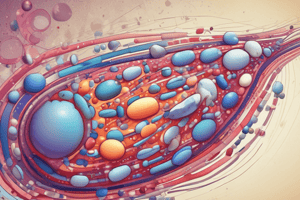Podcast
Questions and Answers
What is the primary indication for the use of NSAIDs such as indomethacin and sulindac?
What is the primary indication for the use of NSAIDs such as indomethacin and sulindac?
- Reduction of inflammation in rheumatoid arthritis (correct)
- Relief of mild to moderate pain
- Treatment of gout
- Prevention of cardiovascular disease
Which of the following NSAIDs is considered a COX-2 inhibitor?
Which of the following NSAIDs is considered a COX-2 inhibitor?
- Diclofenac sodium
- Ibuprofen
- Celecoxib (correct)
- Naproxen
What is the primary concern when administering NSAIDs to patients with renal impairment?
What is the primary concern when administering NSAIDs to patients with renal impairment?
- Decreased efficacy due to reduced absorption
- Increased risk of gastrointestinal bleeding
- Higher risk of nephrotoxicity (correct)
- Increased risk of cardiovascular events
What is the name of the syndrome associated with the use of aspirin in children with viral infections?
What is the name of the syndrome associated with the use of aspirin in children with viral infections?
Which of the following antigout drugs works by inhibiting the production of uric acid?
Which of the following antigout drugs works by inhibiting the production of uric acid?
What is the most significant concern when combining NSAIDs with other medications?
What is the most significant concern when combining NSAIDs with other medications?
Which NSAID is classified as an enolic acid derivative and is commonly used to treat osteoarthritis?
Which NSAID is classified as an enolic acid derivative and is commonly used to treat osteoarthritis?
What is the primary mechanism of action of the antigout drug, probenecid?
What is the primary mechanism of action of the antigout drug, probenecid?
Which of the following NSAIDs is contraindicated in patients with a history of peptic ulcer disease?
Which of the following NSAIDs is contraindicated in patients with a history of peptic ulcer disease?
What is the primary concern when administering NSAIDs to patients with a history of Reye's syndrome?
What is the primary concern when administering NSAIDs to patients with a history of Reye's syndrome?
Which of the following antigout drugs is available in oral and intravenous formulations?
Which of the following antigout drugs is available in oral and intravenous formulations?
Which of the following NSAIDs has a black box warning for cardiovascular events?
Which of the following NSAIDs has a black box warning for cardiovascular events?
Which of the following NSAIDs is a propionic acid derivative and is available in both oral and topical formulations?
Which of the following NSAIDs is a propionic acid derivative and is available in both oral and topical formulations?
Which of the following antigout drugs increases the excretion of uric acid in the urine?
Which of the following antigout drugs increases the excretion of uric acid in the urine?
Which of the following NSAIDs has a black box warning for gastrointestinal bleeding, but not for cardiovascular events?
Which of the following NSAIDs has a black box warning for gastrointestinal bleeding, but not for cardiovascular events?
Which of the following is a contraindication for the use of aspirin?
Which of the following is a contraindication for the use of aspirin?
Which of the following NSAIDs is classified as an enolic acid derivative and is used to treat juvenile rheumatoid arthritis?
Which of the following NSAIDs is classified as an enolic acid derivative and is used to treat juvenile rheumatoid arthritis?
Which of the following is a common adverse effect of NSAIDs that can lead to a life-threatening condition?
Which of the following is a common adverse effect of NSAIDs that can lead to a life-threatening condition?
Which NSAID is classified as a cyclooxygenase-2 (COX-2) inhibitor and is used to treat osteoarthritis and rheumatoid arthritis?
Which NSAID is classified as a cyclooxygenase-2 (COX-2) inhibitor and is used to treat osteoarthritis and rheumatoid arthritis?
Which antigout drug is used to treat chronic gout and works by reducing the production of uric acid in the body?
Which antigout drug is used to treat chronic gout and works by reducing the production of uric acid in the body?
What is a common adverse effect of NSAIDs that can lead to a life-threatening condition?
What is a common adverse effect of NSAIDs that can lead to a life-threatening condition?
Which NSAID has a black box warning for both cardiovascular events and gastrointestinal bleeding?
Which NSAID has a black box warning for both cardiovascular events and gastrointestinal bleeding?
Which of the following is a nursing implication for both NSAIDs and antigout drugs?
Which of the following is a nursing implication for both NSAIDs and antigout drugs?
Which of the following NSAIDs is contraindicated in patients with a history of peptic ulcer disease?
Which of the following NSAIDs is contraindicated in patients with a history of peptic ulcer disease?
Study Notes
NSAIDs: Common Uses and Types
- Diclofenac sodium, Indomethacin, Sulindac, Tolmetin, Etodolac, and Ketorolac are acetic acid derivatives used as NSAIDs.
- Celecoxib is a Cyclooxygenase-2 (COX-2) inhibitor NSAID.
- Nabumetone, Meloxicam, and Piroxicam are enolic acid derivatives used as NSAIDs.
- Fenoprofen, Flurbiprofen, Ibuprofen, Ketoprofen, Naproxen, and Oxaprozin are propionic acid derivatives used as NSAIDs.
Aspirin
- Aspirin has various uses, but it is contraindicated in certain cases.
- Reye's syndrome is a risk associated with aspirin use.
Adverse Effects of NSAIDs
- NSAIDs have adverse effects on the body.
NSAIDs: Interactions and Renal Function
- NSAIDs interact with other drugs and affect renal function.
Black Box Warning and Salicylate Toxicity
- NSAIDs have a black box warning due to the risk of salicylate toxicity.
Gout and Antigout Drugs
- Allopurinol, Febuxostat, Colchicine, Probenecid, Lesinurad, and Sulfinpyrazone are used to treat gout.
- These drugs have specific indications for treatment.
Nursing Implications
- Nurses should be aware of the implications of using NSAIDs and antigout drugs.
NSAIDs: Common Uses and Types
- Diclofenac sodium, Indomethacin, Sulindac, Tolmetin, Etodolac, and Ketorolac are acetic acid derivatives used as NSAIDs.
- Celecoxib is a Cyclooxygenase-2 (COX-2) inhibitor NSAID.
- Nabumetone, Meloxicam, and Piroxicam are enolic acid derivatives used as NSAIDs.
- Fenoprofen, Flurbiprofen, Ibuprofen, Ketoprofen, Naproxen, and Oxaprozin are propionic acid derivatives used as NSAIDs.
Aspirin
- Aspirin has various uses, but it is contraindicated in certain cases.
- Reye's syndrome is a risk associated with aspirin use.
Adverse Effects of NSAIDs
- NSAIDs have adverse effects on the body.
NSAIDs: Interactions and Renal Function
- NSAIDs interact with other drugs and affect renal function.
Black Box Warning and Salicylate Toxicity
- NSAIDs have a black box warning due to the risk of salicylate toxicity.
Gout and Antigout Drugs
- Allopurinol, Febuxostat, Colchicine, Probenecid, Lesinurad, and Sulfinpyrazone are used to treat gout.
- These drugs have specific indications for treatment.
Nursing Implications
- Nurses should be aware of the implications of using NSAIDs and antigout drugs.
NSAIDs: Common Uses and Types
- Diclofenac sodium, Indomethacin, Sulindac, Tolmetin, Etodolac, and Ketorolac are acetic acid derivatives used as NSAIDs.
- Celecoxib is a Cyclooxygenase-2 (COX-2) inhibitor NSAID.
- Nabumetone, Meloxicam, and Piroxicam are enolic acid derivatives used as NSAIDs.
- Fenoprofen, Flurbiprofen, Ibuprofen, Ketoprofen, Naproxen, and Oxaprozin are propionic acid derivatives used as NSAIDs.
Aspirin
- Aspirin has various uses, but it is contraindicated in certain cases.
- Reye's syndrome is a risk associated with aspirin use.
Adverse Effects of NSAIDs
- NSAIDs have adverse effects on the body.
NSAIDs: Interactions and Renal Function
- NSAIDs interact with other drugs and affect renal function.
Black Box Warning and Salicylate Toxicity
- NSAIDs have a black box warning due to the risk of salicylate toxicity.
Gout and Antigout Drugs
- Allopurinol, Febuxostat, Colchicine, Probenecid, Lesinurad, and Sulfinpyrazone are used to treat gout.
- These drugs have specific indications for treatment.
Nursing Implications
- Nurses should be aware of the implications of using NSAIDs and antigout drugs.
NSAIDs: Common Uses and Types
- Diclofenac sodium, Indomethacin, Sulindac, Tolmetin, Etodolac, and Ketorolac are acetic acid derivatives used as NSAIDs.
- Celecoxib is a Cyclooxygenase-2 (COX-2) inhibitor NSAID.
- Nabumetone, Meloxicam, and Piroxicam are enolic acid derivatives used as NSAIDs.
- Fenoprofen, Flurbiprofen, Ibuprofen, Ketoprofen, Naproxen, and Oxaprozin are propionic acid derivatives used as NSAIDs.
Aspirin
- Aspirin has various uses, but it is contraindicated in certain cases.
- Reye's syndrome is a risk associated with aspirin use.
Adverse Effects of NSAIDs
- NSAIDs have adverse effects on the body.
NSAIDs: Interactions and Renal Function
- NSAIDs interact with other drugs and affect renal function.
Black Box Warning and Salicylate Toxicity
- NSAIDs have a black box warning due to the risk of salicylate toxicity.
Gout and Antigout Drugs
- Allopurinol, Febuxostat, Colchicine, Probenecid, Lesinurad, and Sulfinpyrazone are used to treat gout.
- These drugs have specific indications for treatment.
Nursing Implications
- Nurses should be aware of the implications of using NSAIDs and antigout drugs.
Studying That Suits You
Use AI to generate personalized quizzes and flashcards to suit your learning preferences.
Description
This quiz covers the different types of NSAIDS, including their derivatives and brand names. Learn about the various classes of NSAIDS and their corresponding medications.




